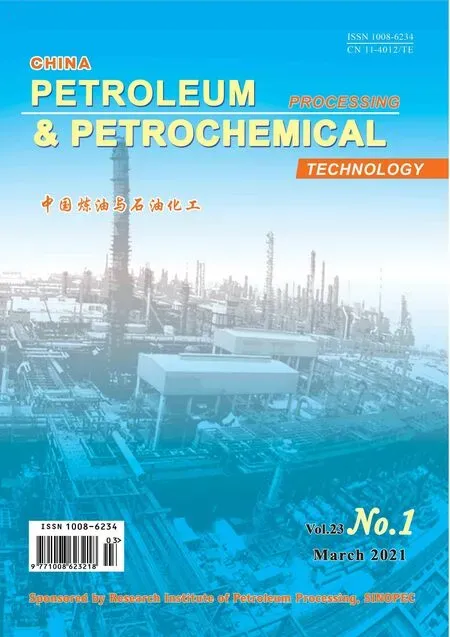High-Efficiency Residue to Chemicals(RTC) Technology Successfully Developed by SINOPEC Research Institute of Petroleum Processing
On September 27, 2020 the high-efficiency Residue to Chemicals (RTC) technology developed independently by the SINOPEC Research Institute of Petroleum Processing(RIPP) passed the technical appraisal organized by the SINOPEC Corporation. This technology has grappled with the problem for manufacturing ethylene and propylene from inferior heavy oils. Compared with the domestic and overseas residue catalytic cracking techniques, the RTC technology demonstrates a better ethylene and propylene selectivity and a lower coke yield to assume an internationally leading level.
As one of the key processes in the petrochemical industry,the catalytic cracking process, besides producing lowcarbon olefins including propylene and ethylene, can also manufacture high-octane gasoline. This process can be deeply integrated with chemical units, such as steam cracking unit and ethylbenzene unit, to form an integrated oil refining and chemical production technology, and the said catalytic cracking technology can serve as the top technique for the refining enterprise to shift to the chemicals production.
Since currently all the catalytic cracking technologies that are available inside and outside of China cannot process inferior heavy oils to some extent, the heavy crude oils, which account for a largest share of feedstock for producing petrochemicals, cannot be utilized efficiently,and this fact will bring about negative impact on transition of Chinese refineries to chemicals production, which will also restrict the development of petrochemical industry in China. Upon processing inferior heavy oils to manufacture olefins, the low reaction selectivity has become a technical bottleneck in olefins production that must be surmounted.To grapple with the above-mentioned problems, RIPP has independently developed the RTC technology. Based on the new understanding relating to the reaction chemistry and process intensification of the catalytic cracking, as well as the molecular level of residue hydrogenation, the research workers have creatively developed a reactor with unique structure and excellent controllability to process inferior heavy oils, which could not ever be treated previously. Furthermore, this uniquely structured reactor has greatly improved the reaction process selectivity,which not only can increase the ethylene and propylene yield, but also can reduce coke yield to improve the gasoline quality. Hence the RTC technology not only can broaden the availability of feedstock for manufacture of olefins in China’s petrochemical industry, but can also provide better product selectivity and product quality to achieve the high-efficiency utilization of heavy crude oils.In January 2020, the RTC technology was applied in a 650 kt/a catalytic cracking unit at the SINOPEC Anqing Branch Company, with the process unit put on stream successfully at the first attempt. When the feedstock with a high ratio of blended residue, the yield of ethylene and propylene was increased by more than 0.5% and 2%, respectively, as compared with that produced by the current process, while the coke yield was reduced by 0.5% coupled with an obvious reduction of olefin content in gasoline and an increase of octane number, which has demonstrated the good commercial application effect of RTC technology. In comparison with the existing process economics, the processing of feedstock blended with different ratio of inferior heavy oils by the RTC technology can bring about an economic benefit equating to 65―105 RMB on every ton of feedstock processed.
The successful development of RTC technology not only can greatly enhance the core competitive edge of China’s petrochemical technology, but also can promote the technical progress of olefins production to play a guiding and exemplary role in the course of upgrading and transition of oil refining enterprises along the route of specified and differentiated petrochemicals production.
- 中國(guó)煉油與石油化工的其它文章
- Preparation and Rheological Properties of Vacuum Lubricating Grease
- Effects of Different Plant Hormones for Microbial Degradation of PASHs and Diesel under Aerobic Conditions
- Nitrogen Removal Performance of Denitrifying Ammonium Oxidation System in Treating Sulfamethoxazole-laden Secondary Wastewater Effluent
- Removal of Basic Nitrogen Compounds from Diesel Fraction with NMP-0.5ZnCl2 Coordinated Ionic Liquid
- Flow Characteristics of Crude Oil with High Water Fraction during Non-heating Gathering and Transportation
- Comparison and Analysis of Toluene Adsorption Properties of ZSM-5 Molecular Sieve Treated by Different Modification Methods: Adsorption Kinetic and Mechanism Studies

